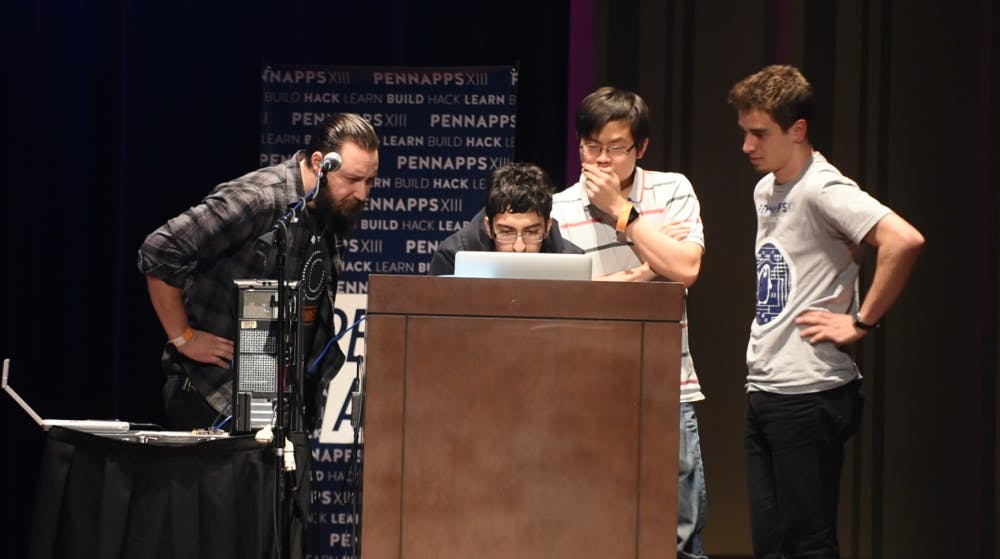
This year's PennApps winners took home the prize with RAMEAR- a radiofrequency communications project.
Credit: Susanna JaramilloThis year’s PennApps winning project can send a piece of code from one computer to another using only radiofrequency — not Wi-Fi, ethernet or Bluetooth.
RAMEAR — which is named because it “listens” to your computer’s RAM (memory) — uses the power of the central processing unit to transmit information to another computer.
The winning, four-man team — made up of Penn physics Ph.D. candidate Rob Roy Fletcher, second-year undergraduates at Imperial College London Tom Hartley and Fu Yong Quah and senior at Bilkent University in Turkey Emrehan Tuzun — worked for 46 hours during the biannual hackathon while the fourth-largest snowstorm in Philadelphia’s history shut down roads and public transportation and cleared out stores.
The team members had very little experience with radio frequency communications but were ready to accept the challenge of experimenting with an idea that they had no idea was possible.
“The moment we connected the receiver ... to the right place and set it to the right frequency, we saw that it was outputting ‘green, light green, dark green,’ and that represented the different power levels,” Hartley said. “That was when we thought, ‘Oh my god, this could actually work.’’’
“There were lots of high fives,” Fletcher said.
Despite the group’s success, the team members joined together because none of them were particularly bent on winning.
“I joined this group because Tom posted on Facebook, ‘Looking for a laid back group that doesn’t care about winning,’” Fletcher said. “This is my first time, and I wanted to come and learn and just have fun. I wasn’t really interested in trying to keep ourselves up for 48 hours straight and going through all this stress. We really just wanted to do something interesting and try new things.”
His teammates agreed that the group was relaxed and focused on the experience rather than the competition.
“Like my friends said, we didn’t expect to win this. This is the most ‘chilled out’ group I’ve been in, but we are so excited about the results,” Tuzun said.
The group confronted some technological problems throughout the 46 hours as they learned about radiofrequencies.
“The biggest challenge was that the signals ... were very small and also very noisy,” Fletcher said. “We had to do quite a bit of signal processing to be able to tell that what we’re seeing isn’t some kind of random noise.”
After the team’s long weekend, they plan to publish the code, allowing people to experiment with and improve upon it.
Reflecting back on the eventful weekend, the members said they hope to return to PennApps and encourage others to participate.
“Learn everything you possibly can,” Fletcher said. “Don’t be afraid to try anything. Be frustrated with it for a week or two trying to get it to work because eventually, it will work, and you will learn so much.”
The Daily Pennsylvanian is an independent, student-run newspaper. Please consider making a donation to support the coverage that shapes the University. Your generosity ensures a future of strong journalism at Penn.
DonatePlease note All comments are eligible for publication in The Daily Pennsylvanian.







